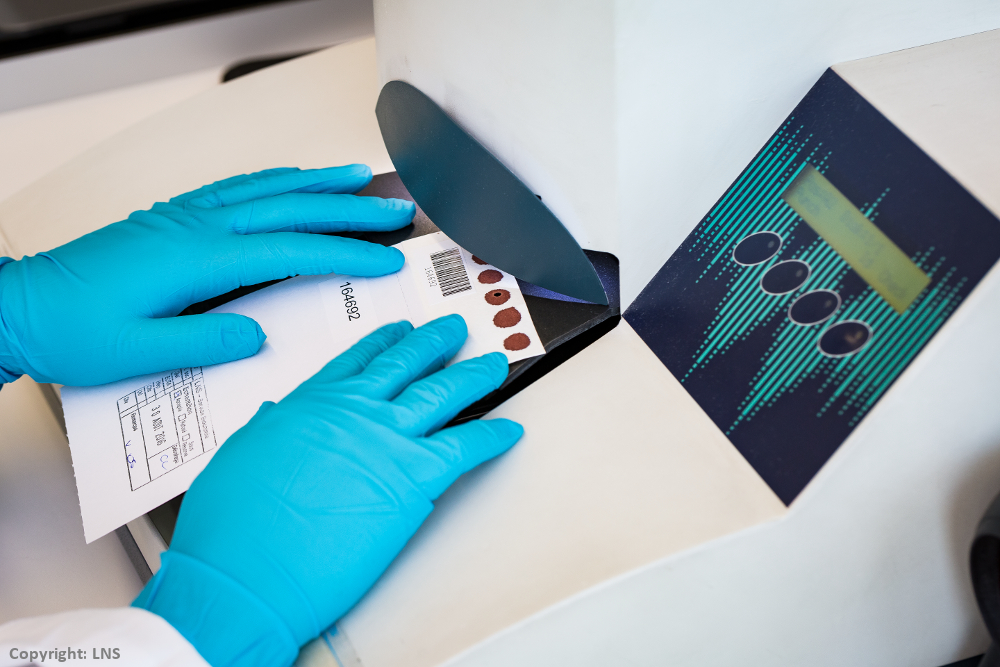- The Laboratory
- Organization
- Departments
- Jobs
- Analysis book
- Contact
- News
- Publications
- Download



Even during pregnancy, expecting mothers are usually closely monitored and examined: Is the baby developing according to its age? Is it getting enough iron? Is the heartbeat regular? As soon as the baby is born, the first paediatrician’s examinations are scheduled in the hospital to ensure that the baby is healthy as early as possible – or to determine whether they have a disability or may be suffering from an illness, so that the best possible care can be provided right from the start.
The medical biology department of the Laboratoire national de santé specialises in the prevention of diseases, both neo- and prenatal, as well as in the treatment of diseases through specific tests. Neonatal screening is carried out systematically on all children born in Luxembourg, and this since 1968. The programme is a public health measure and currently involves testing blood samples for five diseases. In connection to neonatal screening, early diagnosis of metabolic diseases can also be made. In addition, the department has been carrying out prenatal screening for all pregnant women in Luxembourg since 2007 to detect chromosomal abnormalities of the foetus.
Questions for Dr pharm, Dr sc. Patricia Borde, Head of the department of medical biology

What are the five diseases that are tested for during newborn screening and why?
Currently, in Luxembourg, five diseases are systematically screened at birth: phenylketonuria, congenital hypothyroidism, congenital adrenal hyperplasia, MCAD deficiency and mucoviscidosis. The main requirements regarding choice of these diseases, historically based on the Wilson and Jungner criteria, published by WHO in 1968, are that the disease must represent a significant health problem and that action can be taken if it is detected at an early stage. Here is a short overview of these diseases, their consequences and how they can be treated:
Screened for in Luxembourg since 1968, phenylketonuria is a disease caused by a defect in the transformation of phenylalanine, an essential component of our daily diet, into tyrosine. A specific analysis detects an abnormal increase in phenylalanine in the blood of a sick baby, which prevents the baby’s brain from developing normally. Without treatment, children develop severe and irreversible neurological disorders, including mental retardation.
A low-phenylalanine rich diet started early and continued throughout life allows normal development and growth in affected children.
Congenital hypothyroidism has been tested for since 1970. Affected children have insufficient production of thyroxine, a hormone made by the thyroid, which is essential for the proper development of the baby’s brain. If there is insufficient thyroxine, the pituitary gland produces excess TSH (thyreostimulin), which is measured during screening.
Treatment consists of daily oral thyroxine and allows the child to develop normally.
Congenital adrenal hyperplasia has been part of neonatal screening since 2006. This is a genetic disease that engenders abnormal production of hormones secreted by the adrenal glands, resulting in severe dehydration and problems with genital development. Screening comprises testing the concentration of the hormone 17-OH Progesterone.
Treatment consists of daily oral administration of the missing hormones for life, resulting in normal growth and development.
MCAD – Medium Chain Acyl CoA Deshydrogenase – deficiency has been on our list since 2009. In children with this deficiency, the body is unable to metabolise fats and they cannot be used as a source of energy. In the event of increased energy requirements (fasting, infections, fever, diarrhoea, surgery, etc.), children can suffer severe hypoglycaemic attacks (abnormal drop in blood glucose levels). In order to detect the deficiency, the level of acylcarnitines (a fatty acid transporter), which accumulate in the blood of the sick baby is tested.
Fasting periods should be avoided and sufficient glucose intake should be ensured during periods of increased energy need throughout life.
Since 2018, we have also been screening for mucoviscidosis, a genetic disease that causes excessive viscosity of secretions, with consequences for the proper functioning of various organs such as the lungs and the pancreas. Cystic fibrosis is responsible for nutritional disorders and progressive lung damage, which is the most serious aspect of the disease. Clinical diagnosis is often delayed, which is detrimental to the patient.
A screening test using trypsin (a peptidase in the pancreatic juice involved in protein digestion) can identify newborn babies suspected to have inherited the disease. Its interpretation may require a study of the cystic fibrosis gene by molecular biology.
Early management of patients can reduce the frequency of clinical manifestations and ensure a better quality of life.
What happens during neonatal screening?
It involves a simple blood sample, usually taken from the baby’s heel. With the parents’ consent, trained professionals (midwives, nurses, paediatricians, etc.) take a blood sample from the newborn according to a strict protocol established by the Ministry of Health. This sample is sent to the LNS medical biology laboratory and tested for the five diseases mentioned. The search for mutations in the cystic fibrosis gene, if trypsin is elevated, is carried out by the National Genetic Centre at the LNS.
What are the consequences if the samples are positive for one of the diseases?
In case of positive results, the parents are contacted by the doctor of the maternity hospital where the child was born. A second sample is needed to confirm the diagnosis. Parents should not panic as the results of the second test may be normal, as the initial results may be related to the lack of maturity of the newborn’s metabolisms.
Whilst awaiting the results, the doctor can possibly set up a therapeutic protocol. When the results are confirmed, the definitive diagnostic protocol and the appropriate management of the child and their family are put in place. In the case of cystic fibrosis, the Centre Luxembourgeois de la Mucoviscidose (CLMM) at the Centre Hospitalier de Luxembourg (CHL) can contact the parents directly for an appointment.
Why is neonatal screening useful?
Neonatal screening is a public health initiative aimed at screening all newborns for certain rare but serious diseases, most of which are genetic in origin. The aim is to implement appropriate measures before the onset of symptoms in order to avoid or limit the negative consequences of these diseases on the health of children.
In addition to “biological” screening, newborns’ hearing is also tested in the first few hours of life, as well as their sight later on, and then again in the future for severe congenital heart defects at birth. The aim of all these screenings is to minimise the impact of these diseases/abnormalities on the development of babies.
| Overview – the five diseases screened for and their frequencies: • Phenylketonuria – 1/13,500 newborns • Congenital hypothyroidism – 1/3,500 newborns • Congenital adrenal hyperplasia – 1/14,000 newborns • MCAD deficiency – 1/10,000 newborns • Cystic fibrosis – 1/3 500 newborns |
| Medical Biology at the LNS – a multidisciplinary department:
The medical biology department analyses samples for the actors of the Luxembourg health system (Ministry of Health, hospital laboratories and clinical allergists, metabolists, etc.), as well as prisons, socio-educational centres and associations taking care of drug users. Medical toxicology: • To monitor patients’ exposure to addictive and toxic substances (drugs, medicines, heavy metals) Specialised biochemistry-hormonology: • Catecholamines in urine, porphyrins |